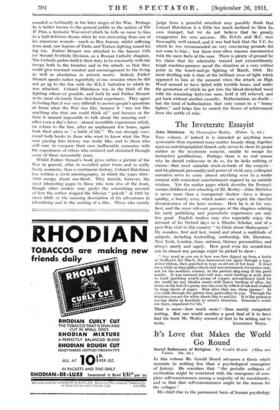The Inveterate Essayist
John Mistletoe. By Christopher Morley. (Faber. 7s. Gd.). Tins volume, if indeed it is intended as anything more systematic than reprinted essay-matter loosely slung together upon an autobiographical thread, only serves to show its genial author as the inveterate essayist, unable to escape his instinctive predilections. Perhaps there is no real reason why he should endeavour to do so, for he lacks nothing of charm—that most valuable stock-in-trade of the essayist— and his pleasant personality and power of vivid, easy, colloquial narrative serve to carry almost anything over to a reader content with consistent entertainment sugared by an amiable wisdom. Yet the earlier pages which describe the Pennsyl- vanian childhood and schooling of Mr. Morley—John Mistletoe is never more than a transparent shadow—have a deeper quality, a beauty even, which makes one regret the cheerful discursiveness of the later sections. Here he is at his very best, and the more relevant passages of the chapters relating his early publishing and journalistic experiences are only less good. English readers may also especially enjoy the account of his Oxford days as a Rhodes Scholar, and of a post-War visit to this country " to think about Shakespeare." He wanders, first and last, round and about a multitude of subjects, including bookselling, authorship, life, literature, New York, London, time, autumn, literary personalities, and always sanely and sagely. How good even his second-best- can be almost any passage might be picked to show :
" Any word as you see it here was first dipped up from a bottle of Stafford's Jet Black, then hammered out again through a type, writer ribbon, then punched in type on slivers of hot lead. It lived for a while on long galley-sheets and was murmured, for syntax only, not for the aesthetic ecstasy, in the patient sing-song of the proof reader. It was rammed into soft wax, went bathing in acid, drew, to itself sparkling wraith-atoms of copper, strengthened itself for the world (as any idealist must) with heavy backing of alloy, lay down on the bed of a press, was run over by rollers of ink and crushed by huge sheets of paper. How alive they are, those presses ! As you walk throUgh the garden they gesticulate to you. Through the windows you see the white sheets flap to and fro. It is like prisoners waving shirts or kerchiefs to attract attention. Someone's words are there, impatient for life."
That is more—how much more !—than merely competent, writing. But one would sacrifice a good deal of it to have had the book Mr. Morley seemed at first to be setting out to.


































 Previous page
Previous page